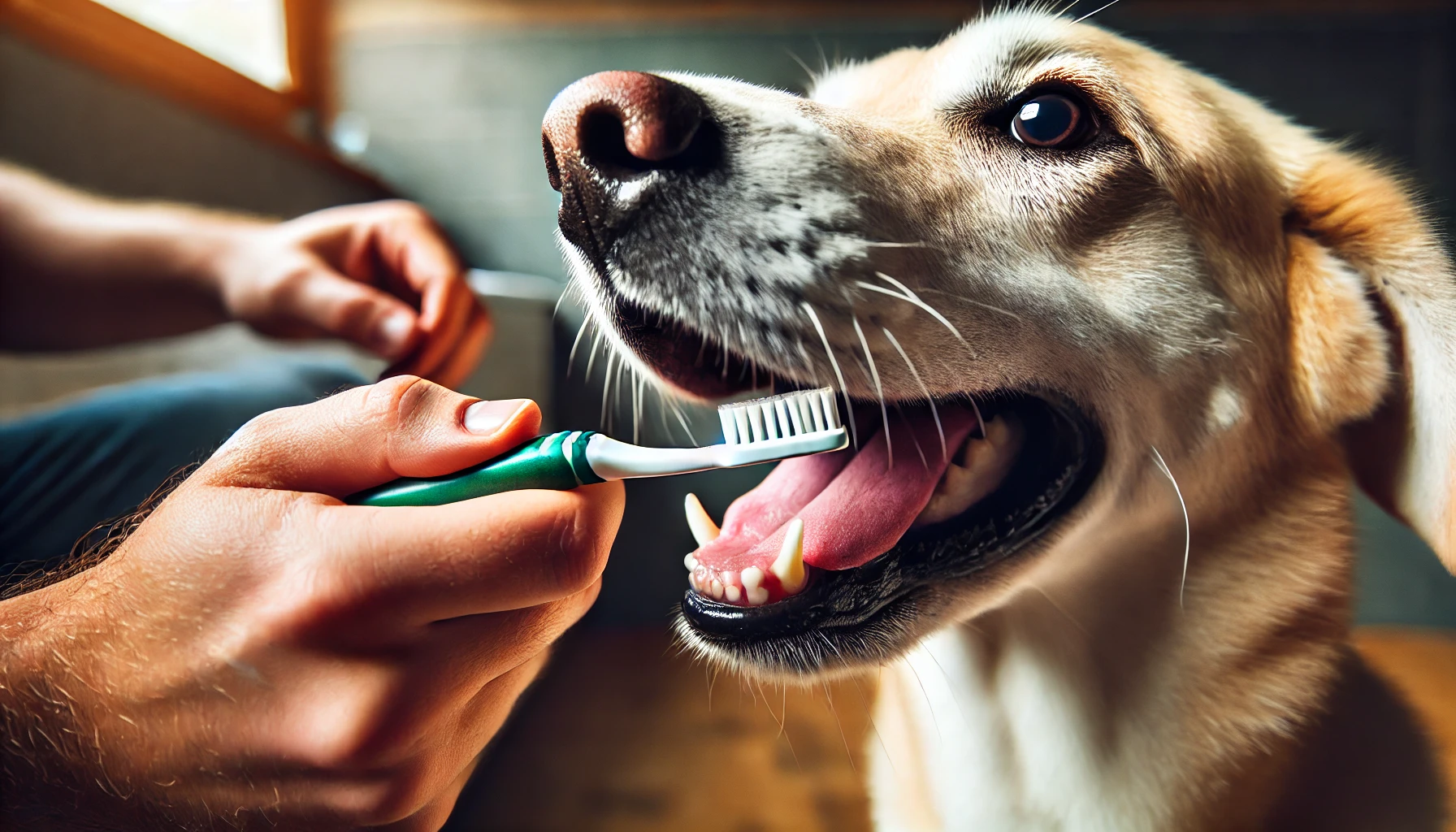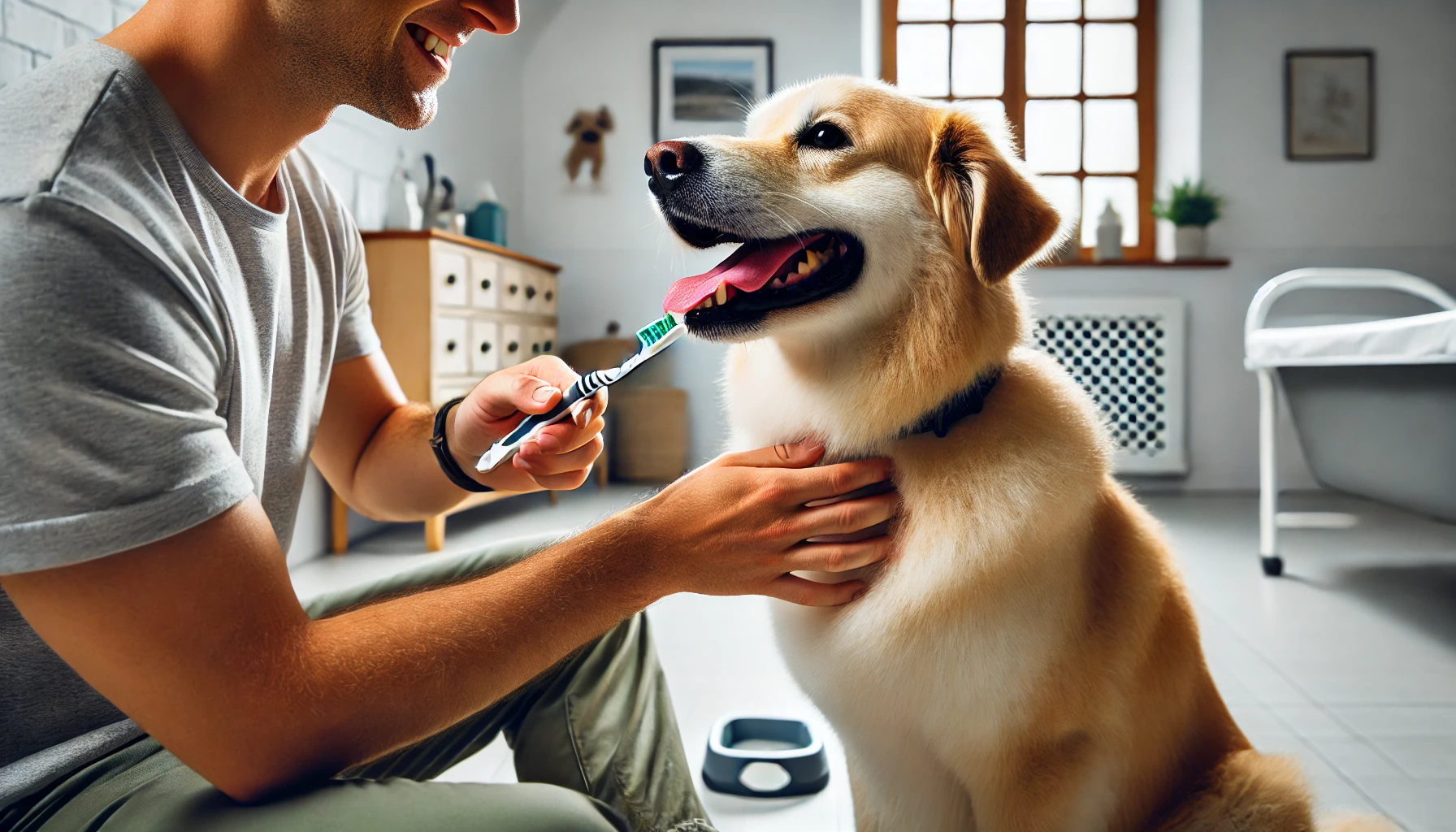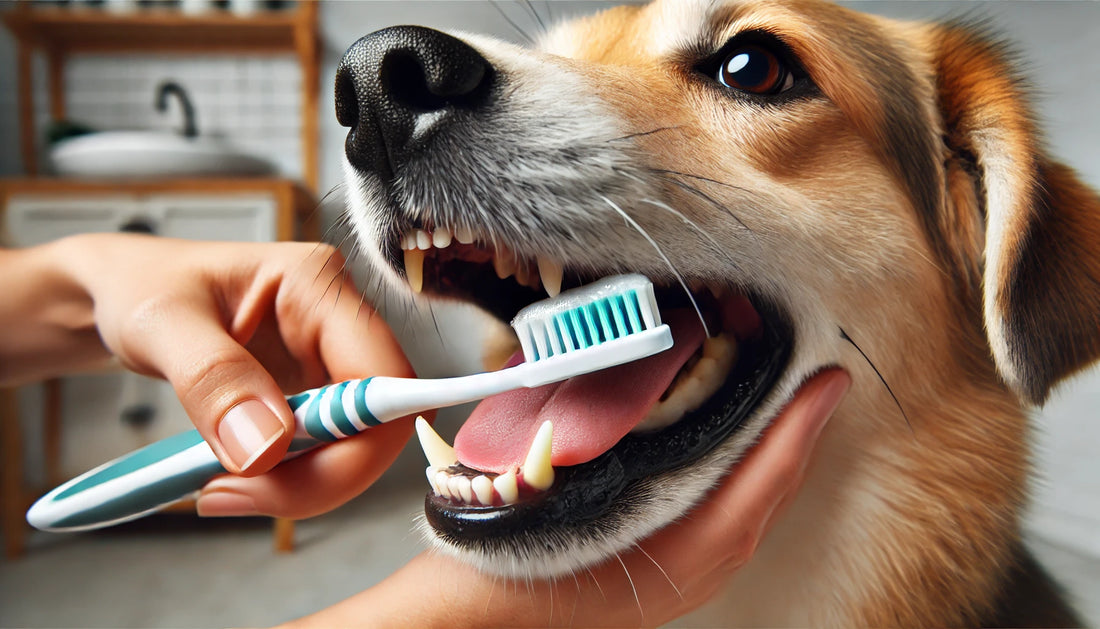Maintaining proper oral hygiene for your furry companion is paramount for their overall well-being. Just as with humans, neglecting your pet's dental care can result in various health issues. Regularly brushing your dog's teeth plays a crucial role in preventing plaque, tartar, and gum disease, which could escalate into more severe conditions if ignored. By integrating this simple practice into your pet care regimen, you can significantly enhance your dog's oral health and potentially prolong their life. Alongside brushing, incorporating dental chews and scheduling routine veterinary check-ups are vital components of a holistic dental care routine for your beloved pet. Let's explore further why attending to your dog's dental health is a fundamental aspect of responsible pet parenting.
Why Brushing Your Dog's Teeth is Crucial
Prevention of Dental Diseases
Regular brushing of your dog's teeth is crucial for preventing the buildup of plaque and tartar, which can lead to serious dental diseases such as gingivitis and periodontal disease. These conditions not only cause discomfort but can also result in tooth loss and infections that may affect your dog's overall health.
Improvement in Overall Health
Maintaining good oral hygiene through regular brushing not only benefits your dog's teeth and gums but also contributes to their overall health. Dental issues can have far-reaching consequences, impacting vital organs such as the heart, liver, and kidneys. By prioritizing your dog's dental care, you are taking a proactive step in safeguarding their well-being and longevity.
Enhancement of Your Dog's Quality of Life
A clean and healthy mouth is essential for your dog's quality of life. Imagine the discomfort of trying to eat with a painful tooth or the frustration of not being able to enjoy playtime due to oral pain. By incorporating regular brushing into your dog's routine, you are ensuring that they can eat, play, and interact without any hindrances, promoting a happy and fulfilling life.
Importance of Professional Dental Care
While at-home brushing is crucial, professional dental care is also essential for your dog's oral health. Regular dental check-ups and cleanings by a veterinarian can help identify and address any underlying issues early on, preventing potential complications and ensuring comprehensive dental care for your furry companion.
Choosing the Right Dental Products
Selecting the appropriate dental products for your dog is key to effective oral care. From toothbrushes and toothpaste to dental chews and water additives, there is a wide range of options available. Consult with your veterinarian to determine the most suitable products for your dog's specific needs and preferences.
Establishing a Dental Care Routine
Consistency is key when it comes to dental care. Establishing a regular brushing routine, ideally on a daily basis, can significantly impact your dog's oral health. Introduce dental care gradually, using positive reinforcement and rewards to make the experience enjoyable for your dog.
Brushing your dog's teeth is not just a grooming task but a vital aspect of their overall health and well-being. By prioritizing their dental care, you are investing in a happier, healthier life for your beloved pet. Remember, a healthy smile leads to a happy tail!

How to Properly Brush Your Dog's Teeth
Choosing the Right Toothbrush and Toothpaste for Dogs
Selecting the appropriate toothbrush and toothpaste for your canine companion is essential for maintaining their oral hygiene. When picking a toothbrush, opt for one specifically designed for dogs, featuring soft bristles and a long handle for easy maneuvering. Additionally, ensure to use toothpaste formulated for dogs, as human toothpaste can contain ingredients that are harmful if swallowed by your pet.
Step-By-Step Guide to Brushing Your Dog's Teeth
- Introducing the Toothbrush: Allow your dog to sniff and lick the toothbrush to familiarize themselves with it before starting the brushing process.
- Start Gradually: Begin by gently lifting your dog's lips and brushing along the gum line in a circular motion. Take your time to ensure a thorough clean.
- Focus on Outer Surfaces: Concentrate on the outer surfaces of the teeth, as these areas are more prone to plaque accumulation and tartar buildup.
- Reward and Reinforce: After each brushing session, praise and reward your dog with treats or affection to create a positive association with the activity.
Tips for a Smooth Teeth-Brushing Experience
- Practice Patience: Brushing your dog's teeth may require patience and persistence, especially if they are not accustomed to the process. Stay calm and patient throughout.
- Positive Reinforcement: Use positive reinforcement techniques such as treats, verbal praise, or playtime to reward good behavior during brushing sessions.
- Early Introduction: Start introducing teeth brushing to your dog at a young age to establish it as a regular part of their grooming routine.
- Professional Assistance: If you encounter difficulties in brushing your dog's teeth or notice any oral health concerns, seek advice from your veterinarian for professional guidance or dental cleaning.
Additional Considerations for Canine Dental Care
In addition to regular brushing, consider providing dental chews or toys designed to promote dental health. These aids can help reduce plaque and tartar buildup between brushings. Moreover, scheduling annual dental check-ups with your veterinarian can aid in early detection of dental issues and ensure comprehensive oral care for your furry friend.
By incorporating these strategies into your dog's dental care regimen, you can contribute to their overall health and well-being, ensuring a happy smile and a healthy mouth.
Frequency and Maintenance
Recommended Frequency of Brushing Your Dog's Teeth
Maintaining your dog's oral health is crucial for their overall well-being. Regular brushing is key to preventing dental issues. Aim to brush your dog's teeth at least 2-3 times a week to effectively remove plaque and tartar buildup. Using a dog-specific toothbrush and toothpaste is essential to ensure safety and effectiveness. Additionally, consider establishing a routine to make brushing more manageable for both you and your furry friend.
Other Oral Care Options for Dogs
While brushing is the gold standard for oral care, there are other supplementary options available to enhance your dog's dental hygiene. Dental chews not only provide a tasty treat but also help in reducing plaque. Water additives can be added to your dog's drinking water to promote oral health. Dental wipes are convenient for dogs who may not tolerate brushing well. Consult with your veterinarian to determine the most suitable combination of oral care products for your dog's specific needs.
Signs of Dental Issues to Watch Out For
Being proactive in monitoring your dog's oral health can help catch dental problems early. Watch out for signs such as persistent bad breath, swollen or bleeding gums, reluctance to eat hard food, and loose teeth. Additionally, pay attention to any changes in your dog's chewing habits or pawing at the mouth. If you notice any of these symptoms, it's crucial to schedule a dental check-up with your vet promptly. Remember, preventive care is key to maintaining your dog's dental health and overall quality of life.
Importance of Regular Veterinary Dental Check-ups
In addition to home care, regular veterinary dental check-ups are essential for your dog's oral health. Your veterinarian can perform a thorough examination of your dog's teeth and gums, identifying any potential issues early on. Professional cleanings may also be recommended to address tartar buildup that cannot be removed through brushing alone. These check-ups are crucial for maintaining your dog's oral hygiene and preventing serious dental problems.
Nutritional Impact on Dental Health
Diet plays a significant role in your dog's dental health. Feeding your dog a balanced diet that promotes dental health can contribute to stronger teeth and gums. Consider incorporating dental-specific diets or dental treats that are designed to help reduce plaque and tartar. Your veterinarian can provide recommendations on suitable dietary options that support your dog's oral care needs.
Training and Desensitization for Effective Brushing
Introducing your dog to tooth brushing at a young age can help them become more comfortable with the process. Start by gently massaging your dog's gums with your finger to accustom them to the sensation. Gradually introduce a dog toothbrush and toothpaste, using positive reinforcement to make the experience positive for your pet. Consistent training and desensitization can help make brushing a stress-free routine for both you and your dog.
Maintaining your dog's oral health through regular brushing, appropriate oral care products, and vigilant monitoring is essential for their overall well-being. By staying proactive and seeking professional veterinary care when needed, you can ensure that your furry companion enjoys a healthy smile and a happy life.

Professional Dental Care for Dogs
Importance of Regular Veterinary Dental Check-ups
Regular veterinary dental check-ups are crucial for ensuring your dog's oral health remains in top condition. These check-ups allow veterinarians to detect any potential issues early on, such as plaque buildup, gum disease, or tooth decay. By addressing these problems promptly, further complications can be prevented, ultimately saving you and your pet from unnecessary pain and discomfort.
Professional Dental Cleaning Procedures for Dogs
Professional dental cleanings for dogs are comprehensive procedures that go beyond what regular at-home dental care can achieve. The process typically involves a thorough examination, scaling to remove stubborn plaque and tartar, polishing to smooth the tooth surfaces, and in some cases, extractions if teeth are severely damaged. Anesthesia is commonly used during these cleanings to ensure the safety and comfort of the dog throughout the process.
Cost Considerations and Benefits of Professional Dental Care
While the cost of professional dental care for dogs may seem daunting, the long-term benefits far outweigh the expenses. By investing in regular dental cleanings, you are not only preventing costly dental issues down the line but also promoting your dog's overall well-being. Good oral health can have a significant impact on your pet's quality of life and longevity, making it a worthwhile investment in their future happiness and health.
Additional Tips for Maintaining Your Dog's Oral Health
In addition to professional dental care, there are several ways you can help maintain your dog's oral hygiene at home. Regular brushing, providing dental chews or toys, and incorporating dental-friendly treats into their diet can all contribute to healthier teeth and gums. Consulting with your veterinarian about the best oral care practices for your dog's specific needs can further enhance their dental health and overall wellness.
The Link Between Oral Health and Overall Well-being
It's essential to recognize that a dog's oral health is closely linked to their overall well-being. Poor dental hygiene can lead to not only dental issues but also systemic health problems. Bacteria from dental infections can enter the bloodstream and affect vital organs, potentially causing serious health complications. By prioritizing your dog's dental care, you are not just ensuring a healthy smile but also safeguarding their entire body against potential illnesses.
Educating Pet Owners on Dental Care
As a responsible pet owner, it's crucial to educate yourself about the importance of dental care for dogs. Understanding the significance of regular check-ups, proper cleaning techniques, and signs of dental problems can empower you to take proactive steps in maintaining your dog's oral health. By partnering with your veterinarian and staying informed about the latest advancements in veterinary dentistry, you can provide the best possible care for your furry companion.
Conclusion
Professional dental care is an essential aspect of your dog's healthcare routine. By prioritizing regular check-ups and cleanings, you are not only safeguarding their oral health but also investing in their long-term comfort and happiness. Remember, a healthy smile leads to a happy tail-wagging companion!.

